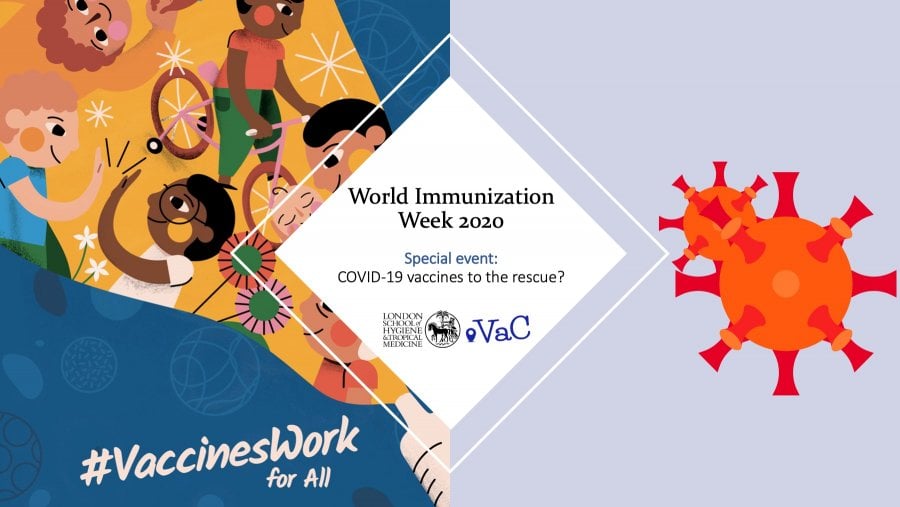COVID-19 vaccines to the rescue?
This World Immunisation Week, join us for a series of webinars hosted by LSHTM Vaccine Centre between Friday 24 April to Friday 1 May 2020.

At the end of World Immunisation Week and with the COVID epidemic occupying everyone’s mind, we have put together a special session involving academics from LSHTM to discuss the current progress towards a vaccine for the novel COVID-19 virus.
They will introduce you to a new tool published by the Vaccine Centre to track progress of vaccine candidates currently in the pipeline for COVID-19 and discuss the latest research and modelling done on the impact of the COVID-19 response on routine immunisation programmes in LMICs.
We talk to experts about what we can learn from the response to Ebola and the related vaccine development and trials and how these lessons can be applied to the context of the current epidemic.
The session will be introduced by Professor Beate Kampmann, the Director of LSHTM Vaccine Centre & MRC Unit The Gambia at LSHTM Theme Leader
Speakers
- Professor Polly Roy: Professor of Virology, LSHTM.
“How to make a COVID vaccine?” -
Professor Polly Roy is a Professor of Virology in the Department of Pathogen Molecular Biology within the Infectious and Tropical Diseases Faculty. She received her PhD in Molecular Virology from New York University/Columbia University Medical School. She came to the University of Oxford, UK, through a senior International Fogarty fellowship, where she gradually developed a second virology lab whilst maintaining her research lab at UAB until 2005. She moved as Virology Professor to the School in 2001, where she leads a large group of researchers.
For the last three decades, the predominant subject of Roy’s work, although not exclusively, has been the Bluetongue Virus (BTV), a complex layered virus that is a member of the Reoviridae family. Roy has made significant contributions to understanding the basic molecular and cell biology, atomic structure, mechanisms of virus entry, genome synthesis, RNA packaging, capsid assembly, egress and cell-to cell transmission of these viruses. Her multi-disciplinary approach and comprehensive research coverage has led to the successful development of improved diagnostic assays, more efficacious VLP vaccines, alternative Entry Competent Replication Abortive vaccine (ECRA) for BTV and African Horse sickness viruses (AHSV) and alternative therapeutic possibilities in addition to the fundamental scientific advance discovered. Roy’s work has been recognised around the world and she has received many awards including; the Officer of the Order of the British Empire (OBE) for service in Virus research.
- Dr Adam Kucharski: Associate Professor, Mathematics, LSHTM
-
Dr Kucharski's research focuses on the dynamics of infectious diseases. In particular, how social behaviour and immunity shape disease transmission, and how knowledge of such processes can enhance control measures. His current work is funded by a Wellcome Trust/Royal Society Sir Henry Dale Fellowship. From 2013–17, Adam held a Medical Research Council Career Development Award in Biostatistics. Prior to joining LSHTM in October 2013 he was a postdoc at Imperial College London. He has a degree in mathematics from the University of Warwick (2009) and a PhD in applied mathematics from the University of Cambridge (2012).
- Professor Mark Jit: Professor of Vaccine Epidemiology, LSHTM
-
Professor Jit works both at LSHTM and in the Modelling and Economics Unit of Public Health England in Colindale. He also holds a visiting professorship at the School of Public Health, University of Hong Kong. His main research focus is investigating the epidemiological and economic impact of vaccines and other infectious disease control interventions to support evidence-based public health decision making.
Much of this work uses transmission dynamic models to capture ecological effects of interventions beyond the individual. In particular, he is interested in the use of modelling to inform the interface between technical questions about projecting the impact that vaccines can have, and normative questions about what health and economic goals we should pursue.
Mark works closely with decision makers such as the World Health Organization, country governments and national immunisation technical advisory groups such as the UK's Joint Committee on Vaccination and Immunisation. His work has helped inform immunisation policy on a range of vaccines (including measles, HPV, pneumococcal, rotavirus, influenza and dengue vaccines) in both developed and developing countries, in close collaboration with partners based in those countries.
- Professor Daniel Bausch: Professor in Department of Disease Control, LSHTM
-
Professor Bausch is a physician and virologist trained in internal medicine, infectious diseases, tropical medicine, and public health specializing in the research and control of emerging tropical viruses. He is the Director of the United Kingdom Public Health Rapid Support Team (UK-PHRST) coordinating the UK’s public health response to outbreaks in low- and middle-income countries (LMICs).
Prior to working for UK-PHRST and LSHTM Daniel worked at the World Health Organization in Geneva as a Technical Lead for Epidemic Clinical Management Department. he also work for the U.S. Naval Medical Research Unit in Peru as Head of Virology and Emerging Infections Department, the Tulane School of Public Health and Tropical Medicine in New Orleans as Professor of Tropical Medicine and U.S. CDC in the the Viral Special Pathogens Epidemiology Unit and as a Commissioned Corps Medical Officer.
- Dr Kaja Abbas: Assistant Professor in Disease Modelling, Modelling and Economic Evaluation of Vaccines (MEEV) group, LSHTM
-
Dr Abbas' research area is vaccine impact modelling at the interface of infectious disease epidemiology and health economics, with a focus on estimating the health and economic impact of vaccination programmes. Kaja works in the Department of Infectious Disease Epidemiology and is a theme lead on vaccines with the Centre for the Mathematical Modelling of Infectious Diseases (CMMID). As a member of the Vaccine Impact Modelling Consortium, he models the health impact of HPV vaccination of adolescent girls in low and middle-income countries. The Consortium is funded by Gavi, the Vaccine Alliance and the Bill & Melinda Gates Foundation, and the data generated by the Consortium supports the evaluation of the two organisations’ existing vaccination programmes, and inform potential future investments and vaccine scale-up opportunities.
- Dr Ed Parker: Research Fellow in Systems Biology, LSHTM
-
Dr Parker completed a BA in Biological Sciences at Oxford University, an MSc in Laboratory Medicine at the University of Toronto, and a PhD in infectious disease epidemiology at Imperial College London. His work considers why oral vaccines (such as those targeting polio and rotavirus) have consistently proven to be less effective in low-income countries. To date, he has focused on the possible contribution of the microbiome to this phenomenon, applying a range of lab and bioinformatic tools to sequence gut bacteria and viruses.
At LSHTM, Ed is working to gain a deeper understanding of the interconnected system of the microbiome is shaped and is in turn shaped by host immunity, gene expression, protein production, and metabolism thereby shedding light on the fundamental mechanisms that shape vaccine immunity.
#VaccinesWork for All
Full programme on LSHTM's World Immunisation Week 2020
Admission
Contact


